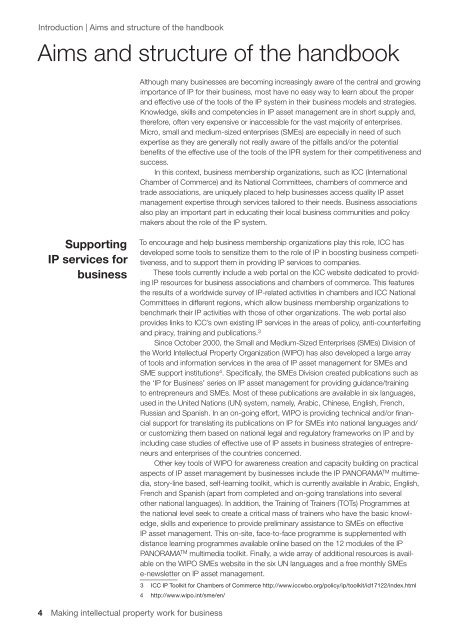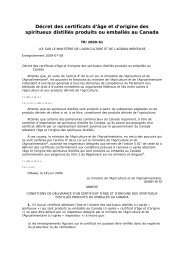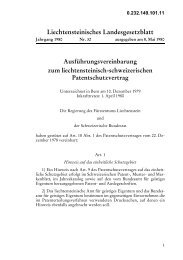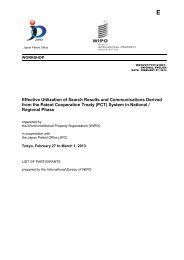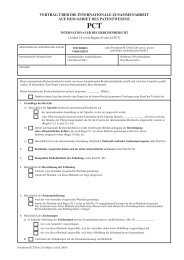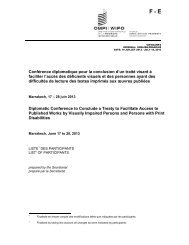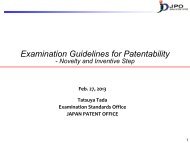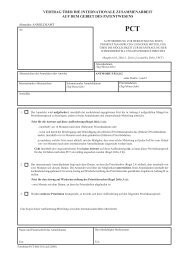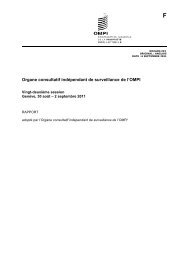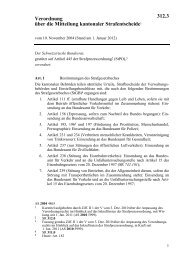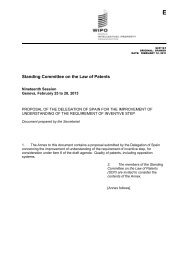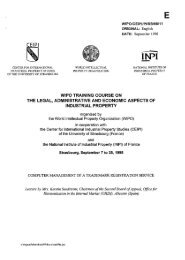Making intellectual property work for business - World Intellectual ...
Making intellectual property work for business - World Intellectual ...
Making intellectual property work for business - World Intellectual ...
You also want an ePaper? Increase the reach of your titles
YUMPU automatically turns print PDFs into web optimized ePapers that Google loves.
Introduction | Aims and structure of the handbook<br />
Aims and structure of the handbook<br />
Supporting<br />
IP services <strong>for</strong><br />
<strong>business</strong><br />
4 <strong>Making</strong> <strong>intellectual</strong> <strong>property</strong> <strong>work</strong> <strong>for</strong> <strong>business</strong><br />
Although many <strong>business</strong>es are becoming increasingly aware of the central and growing<br />
importance of IP <strong>for</strong> their <strong>business</strong>, most have no easy way to learn about the proper<br />
and effective use of the tools of the IP system in their <strong>business</strong> models and strategies.<br />
Knowledge, skills and competencies in IP asset management are in short supply and,<br />
there<strong>for</strong>e, often very expensive or inaccessible <strong>for</strong> the vast majority of enterprises.<br />
Micro, small and medium-sized enterprises (SMEs) are especially in need of such<br />
expertise as they are generally not really aware of the pitfalls and/or the potential<br />
benefits of the effective use of the tools of the IPR system <strong>for</strong> their competitiveness and<br />
success.<br />
In this context, <strong>business</strong> membership organizations, such as ICC (International<br />
Chamber of Commerce) and its National Committees, chambers of commerce and<br />
trade associations, are uniquely placed to help <strong>business</strong>es access quality IP asset<br />
management expertise through services tailored to their needs. Business associations<br />
also play an important part in educating their local <strong>business</strong> communities and policy<br />
makers about the role of the IP system.<br />
To encourage and help <strong>business</strong> membership organizations play this role, ICC has<br />
developed some tools to sensitize them to the role of IP in boosting <strong>business</strong> competitiveness,<br />
and to support them in providing IP services to companies.<br />
These tools currently include a web portal on the ICC website dedicated to providing<br />
IP resources <strong>for</strong> <strong>business</strong> associations and chambers of commerce. This features<br />
the results of a worldwide survey of IP-related activities in chambers and ICC National<br />
Committees in different regions, which allow <strong>business</strong> membership organizations to<br />
benchmark their IP activities with those of other organizations. The web portal also<br />
provides links to ICC’s own existing IP services in the areas of policy, anti-counterfeiting<br />
and piracy, training and publications. 3<br />
Since October 2000, the Small and Medium-Sized Enterprises (SMEs) Division of<br />
the <strong>World</strong> <strong>Intellectual</strong> Property Organization (WIPO) has also developed a large array<br />
of tools and in<strong>for</strong>mation services in the area of IP asset management <strong>for</strong> SMEs and<br />
SME support institutions 4 . Specifically, the SMEs Division created publications such as<br />
the ‘IP <strong>for</strong> Business’ series on IP asset management <strong>for</strong> providing guidance/training<br />
to entrepreneurs and SMEs. Most of these publications are available in six languages,<br />
used in the United Nations (UN) system, namely, Arabic, Chinese, English, French,<br />
Russian and Spanish. In an on-going ef<strong>for</strong>t, WIPO is providing technical and/or financial<br />
support <strong>for</strong> translating its publications on IP <strong>for</strong> SMEs into national languages and/<br />
or customizing them based on national legal and regulatory frame<strong>work</strong>s on IP and by<br />
including case studies of effective use of IP assets in <strong>business</strong> strategies of entrepreneurs<br />
and enterprises of the countries concerned.<br />
Other key tools of WIPO <strong>for</strong> awareness creation and capacity building on practical<br />
aspects of IP asset management by <strong>business</strong>es include the IP PANORAMA TM multimedia,<br />
story-line based, self-learning toolkit, which is currently available in Arabic, English,<br />
French and Spanish (apart from completed and on-going translations into several<br />
other national languages). In addition, the Training of Trainers (TOTs) Programmes at<br />
the national level seek to create a critical mass of trainers who have the basic knowledge,<br />
skills and experience to provide preliminary assistance to SMEs on effective<br />
IP asset management. This on-site, face-to-face programme is supplemented with<br />
distance learning programmes available online based on the 12 modules of the IP<br />
PANORAMA TM multimedia toolkit. Finally, a wide array of additional resources is available<br />
on the WIPO SMEs website in the six UN languages and a free monthly SMEs<br />
e-newsletter on IP asset management.<br />
3 ICC IP Toolkit <strong>for</strong> Chambers of Commerce http://www.iccwbo.org/policy/ip/toolkit/id17122/index.html<br />
4 http://www.wipo.int/sme/en/


